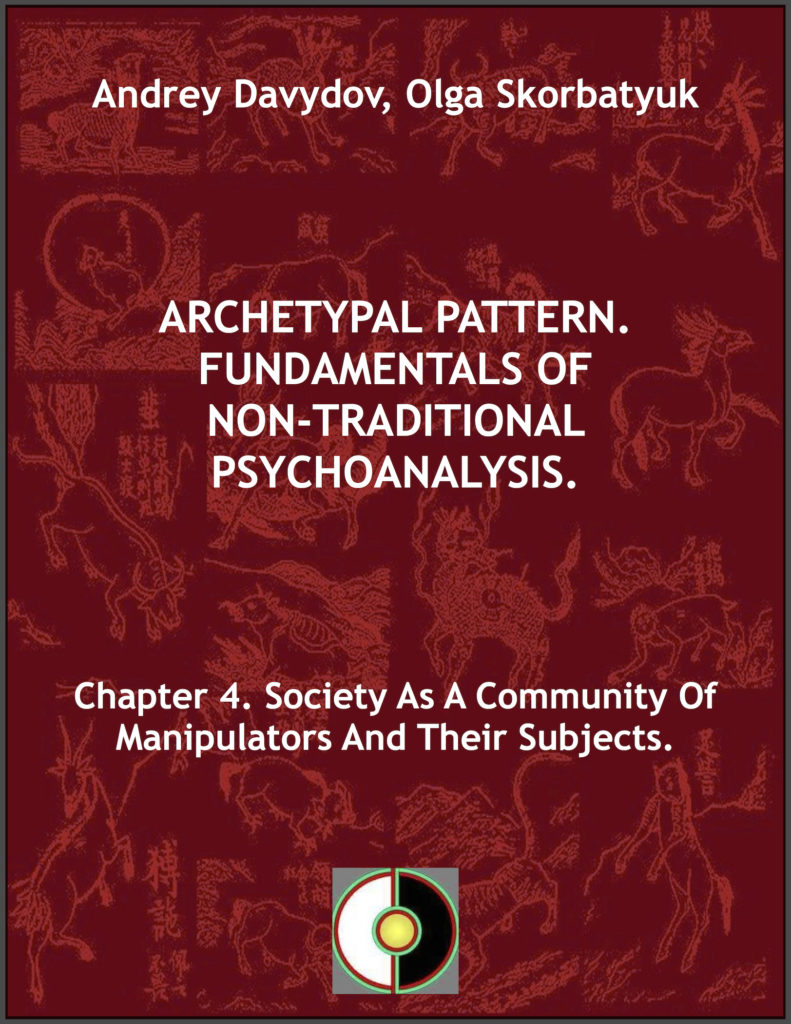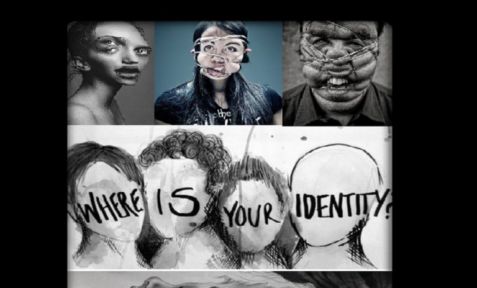ARCHETYPAL PATTERN. FUNDAMENTALS OF NON-TRADITIONAL PSYCHOANALYSIS. Textbook.

ISBN: 9781311809353
(Purchase an eBook or an AudioBook in English or in Russian.)
Society As A Community Of Manipulators And Their Subjects.
Andrey Davydov and Olga Skorbatyuk
Translated by Kate Bazilevsky.
The following statement can be considered the main hypothesis that formed the basis of this article: all types of interpersonal relationships in the human community are built entirely on manipulation as a principle. Any kinds of contacts and attachments between people (friendship, romance, business, partnership, parent-child relationships) are based on manipulation of each other as an unconscious motivation. Consequently, the human community lives, develops, functions and is regulated on the basis of manipulation. And, if manipulation of one another by individuals is an effective way to quickly and qualitatively satisfy any kind of their needs in society, then it is fair to consider society as a community of manipulators and their subjects.
Let’s examine this statement. It must be noted that our research is carried out in line with psychoanalysis. We do not study the conscious part of the psyche. We study the unconscious, and therefore, when we consider the question of motivation, we are interested solely in unconscious motivation. It is known that all attempts of an individual who is being studied to declare anything about himself or herself, as a rule, are not considered by a psychologist of psychodynamic orientation, as these declarations have no relation to the actual situation whatsoever. A story told by a person (a client, a person being studied, a test subject) about himself, his beliefs, perceptions, as well as motivations have a purely self-presentation character, and nothing more.
The concept of “motivation” exists in psychology and, as practice shows, it corresponds to a much greater extent to that what any types of self-presentation actually represent. After all, a human, as a “social animal” is forced to live by the laws of society, is raised since childhood in a manner to conform to these laws, and learns to hide his or her real motives. This is the essence of upbringing: to one way or another socialize an individual, to teach him or her social demands, without which social interactions become impossible. From our point of view, upbringing does not have any other functions because a human is already born with a certain set of psychophysiological properties and personality qualities recorded in his or her individual archetypal pattern, which cannot be changed neither by parents nor by caregivers. Therefore, we focus only on the study of unconscious motivations, as the true cause of human activity. And, when discussing true motivations that arise from the unconscious, we can state that they are fully determined by individual structure of psyche of a person. All true motives of an individual are fully determined by the content of his unconscious: that is—by individual archetypal pattern as the basis of an individual, where all needs and predilections of the individual are contained.
However, going back to the question of upbringing as a way of socialization of an individual, it is possible to state the following: if the necessary degree of socialization as a result of actions during upbringing by family and school for whatever reason has not been reached, then a person has difficulties with interpersonal interactions throughout his life. And, these difficulties not only lead to antisocial actions, but are also causes of internal problems of a human. Why? What is the basis of the phenomenon that an individual who is antisocial according to an innate quality, or is poorly socialized in the process of upbringing, can be literally torn apart by internal conflicts all his life, due to the fact that he does not “fit in” with society? Representatives of psychoanalysis have described such kinds of intrapersonal problems related to society and its impact on a person well enough, and therefore we will not continue with discussion of this issue. Here, we became interested in a different matter: why a person with antisocial orientation (as a property of his nature that is inherent in his individual archetypal pattern) begins to experience internal conflicts due to impossibility of harmonious interaction with other people? Why even an antisocial individual begins to feel uncomfortable due to lack of communication? Why is so important for a person to harmoniously integrate into the social mechanism, and what is the goal of this “integration?” Why community of his own kind is necessary for any individual (regardless of degree of his socialization), and is this society truly made up of people who are alike?
We have decided to clarify this question in the range of the statement that “to live in society and be free from society is impossible.” However, we consider the relation “individual-society” based on understanding that every person living in the society and having a firm dependence on it, above all is an individual who is guided in his actions only by those values, which are inherent in this individual. This view is somewhat contrary to the customary point of view in regard to existence of universal human values. However, we consider universal human values as certain standards invented by people as a unifying element and nothing more. In reality, analysis of attitudes of different people towards so-called universal human values clearly shows that in essence none of the declared “values” are universal. Rather, it is common for a particular group of individuals, but that does not mean the totality of its perception as a value. Kindness, faith, love, children, work, creativity, health, learning, freedom, equality, brotherhood, even human life are not valuable to all the people. This is obvious simply due to the fact that there are murderers and suiciders, to whom neither their own lives, nor lives of others hold any value. And, most notably, they have lived, live, and will live like this, regardless of whether it is condemned by society or not. These people (and, by the way, there is a huge percentage of them in the society) can be persecuted, and they can hide or not hide their unconformities with social rules, norms and ideals, but even the most severe sanctions by authorities, condemnation, epitaphs or exile cannot eradicate these manifestations in people. Why? The answer can be quite simple: such is the nature of these people, and it cannot be changed by anyone except themselves. Therefore, it is possible to suppose that only power obtained as a result of manipulative actions can be a universal goal that people aspire to one way or another; power, with the help of which it is possible to stabilize obtainment from society of necessary components for comfortable psychophysiological state. This aspiration can be valued or despised, denied or accepted, but no one has yet been able to live entirely without this aspiration. Therefore, if it is so important to humanity to have at least something socially universal and common—then, this aspiration can successfully be that…
To read more purchase in English or in Russian.
Bibliography
Yanshina, E. M. (Trans.). (1977). Katalog Gor I Morej (Shan Hai Tszin) [Catalog of Mountains and Seas (Shan Hai Jing)]. Moscow: Nauka.
Oshanin, I. M. (Ed.). (1983). Bol’shoy kitaysko-russkiy slovar’ (BKRS) [Large Chinese-Russian Dictionary (BKRS)] (Vols. 1-4.). Moscow: Nauka.
© 2005 Andrey Davydov, Olga Skorbatyuk. All rights reserved.
Translation © 2014 Kate Bazilevsky. All rights reserved.






